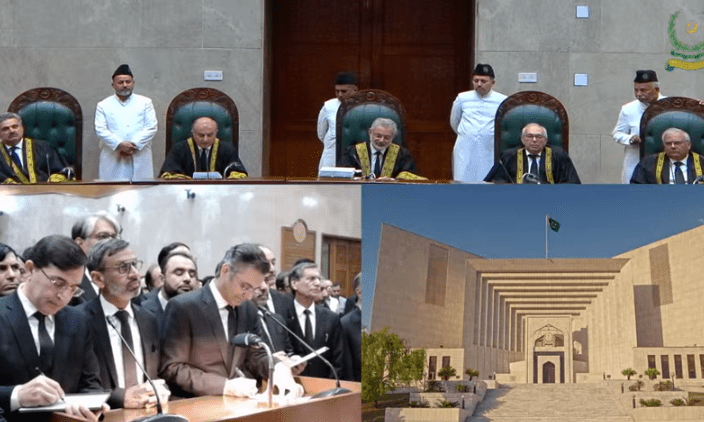The Supreme Court of Pakistan has released a detailed ruling regarding the Pakistan Tehreek-e-Insaf (PTI) party’s reserved seats, declaring that the Election Commission’s decision from March 1 is unconstitutional.
According to Dawn News, the 70-page detailed ruling was authored by Justice Mansoor Ali Shah. The Supreme Court also ordered that the majority ruling regarding the reserved seats be published in Urdu and uploaded to the website as part of the case record.
The ruling states that the Supreme Court nullifies the Peshawar High Court’s decision. It emphasizes that the largest stakeholder in elections is the public and that electoral disputes are fundamentally different from other civil disputes. The court expressed confusion over how so many independent candidates could succeed in a parliamentary democracy based on political parties.
The decision noted that the Election Commission’s March 1 ruling has no legal standing and is unconstitutional. The court expressed surprise at the Election Commission’s conduct, stating that it acted as an opposing party rather than ensuring free and fair elections. The significant errors made by the Election Commission necessitated judicial intervention.
The ruling also highlighted that Rule 94 is in conflict with the Constitution and the Elections Act of 2017. Rule 94 pertains to the allocation of reserved seats, and the court noted that electoral rules can only be formulated in accordance with the Elections Act. The court stated that the clarification of Rule 94 contradicts Article 51(6) of the Constitution and Section 106 of the Elections Act, and denying reserved seats due to a lack of electoral symbol constitutes an additional penalty by the Election Commission.
It was mentioned that if the Supreme Court had clarified the party’s constitutional rights in the case of the electoral symbol, confusion could have been avoided. The Election Commission failed to delineate PTI’s constitutional rights in its orders. The court stressed that no one can be penalized without clear law, and laws that infringe upon constitutional rights should be scrutinized with a narrow perspective.
The ruling asserted that the Election Commission is the guarantor of democratic processes and the fourth pillar of the government, and it failed to fulfill this role in February 2024. The court highlighted that transparent elections are essential for democracy and that PTI is entitled to the reserved seats in the National Assembly, directing the Election Commission to notify PTI’s candidates for these seats.
The Supreme Court clarified that PTI’s application to be party in the case was before them, and decisions on such applications are typically made first.
Two judges expressed dissenting opinions regarding the majority ruling, with Justices Ameen-ud-Din Khan and Naeem Akhtar Afghan declaring the majority decision of July 12 unconstitutional. The ruling stated that it is regrettable that the two judges disagreed, and their dissent was seen as crossing boundaries, undermining the integrity of the court.
The Supreme Court had previously annulled the Peshawar High Court and Election Commission’s decision on July 12, declaring PTI entitled to reserved seats.
Background details from previous hearings include remarks from Justice Athar Minallah that the Election Commission violated the Constitution, and Chief Justice Qazi Faez Isa questioning why PTI had not conducted intra-party elections despite having a year to do so. The Supreme Court’s discussions leading up to the ruling included multiple hearings addressing the specific allocations of reserved seats to the Sunni Ittehad Council and other parties.



